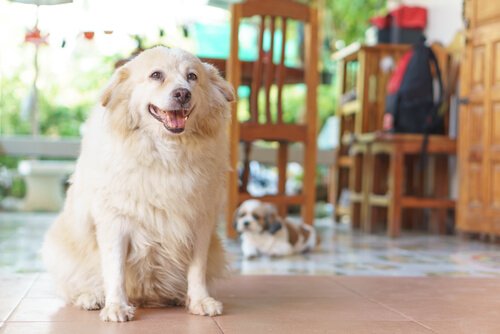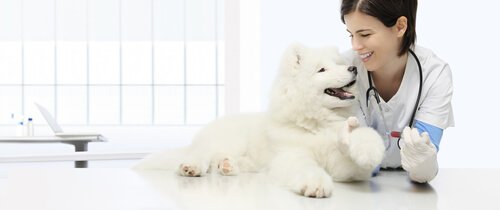Hypothyroidism, causes and treatment
Canine hypothyroidism is a disease that causes a malfunction in the thyroid glands. These glands are located on both sides of the dog's trachea.
The gland Thyroid produces the hormones called thyroid. An important fact, and that almost everyone is unaware of, is that there are two parts of the thyroid hormone: T3 and T4.
T3 is the active part and is produced mostly by the gland thyroid. The rest is produced by the other tissues of the body. On the other hand, T4 is the inactive part of the hormone: it is responsible for circulating through the bloodstream. At the moment that T4 is assimilated by tissues, it becomes T3.
T4 is produced by the pituitary gland, which is at the base of the brain . This gland produces a hormone called HET, responsible for stimulating the thyroid to produce more T4.
The thyroid hormone is responsible for controlling the metabolism of organs and systems of your dog. Also to stimulate the development, growth and maturation of the central nervous system.
Hypothyroidism can be considered as a relatively normal hormonal imbalance in dogs . However, insufficient production of thyroid hormone is not something that should be taken lightly.
All dogs can develop hypothyroidism, but it is more common in the elderly or middle-aged. Among the breeds most likely to develop hypothyroidism are: miniature schnauzer, dachshund, golden retriever and doberman.
Causes of disease and symptoms
There are numerous reasons why your dog might develop hypothyroidism . The three most common reasons are: for a tumor, for your immune system or for a low iodine diet.
Your dog may have a tumor, but it is not always malignant. In almost all cases of problems of the thyroid gland due to a tumor, it is a sebaceous tumor.

This tumor or sebaceous cyst can be removed with a quick and simple surgical operation . Sometimes, if the tumor has invaded the gland, it also needs to be removed whole or part of it.
The immune system can also play against your dog's health. When the thyroid gland is attacked by the immune system, it works too much. Thus, the gland is exhausted and stops working.
Another cause of this disease may be that the food is very low in iodine . The thyroid gland uses iodine to synthesize its hormones. If your pet does not consume enough, your thyroid is unable to fulfill its purpose.
In addition to the above, your dog can acquire this disease by a genetic condition, by atrophy of the gland or even as an effect secondary to another medication that you administer.
But you should not worry too much. If it is detected early, hypothyroidism can be treated and your dog will have an absolutely normal quality of life.
In addition to being overweight, your dog may have numerous symptoms, such as: hair loss, apathy, anemia, high cholesterol levels and lack of balance.
Another symptom may be thickening of tissues in areas such as the head and intolerance at low temperatures. In addition, a dog can present eye problems and nervous system.
Treatment of hypothyroidism
First, it is extremely important to ensure that your pet suffers from hypothyroidism. In most cases, the veterinarian prescribes a treatment with thyroid hormones to compensate for his deficiency .

The dose of this drug, called thyroxine, is decided solely by the veterinarian. The dosage of the medication is determined depending on the size of your dog, its weight and the degree of development of the disease .
When the cause of hypothyroidism is not an autoimmune condition, the Treatment involves stimulating the thyroid tissue to function properly again.
Over time, the initial dose may be too much or too little. Both cases are detrimental to the health of your dog. If you do not consume the right dose of medication, you will not receive proper treatment, so it will not improve and may be dangerous.
If, on the other hand, your dog suffers from hypothyroidism from a tumor or cyst, it must be surgically removed. After removing the tumor, your dog's gland will work with absolute normality
They are not just medicines
In addition to operating or giving your medication, there are other care needs to be taken into account. You should know that feeding plays a key role for the quality of life of your pet.
Implements a diet based on the intake of iodine and tyrosine. Tyrosine is a very important amino acid for your pet's metabolism and even mood .
You should also try to get your dog to eat as little food as possible processed or with chemicals. The more natural, the easier it is for your body to metabolize food.
In addition to all this, it is recommended that you regularly do blood tests . This is a very important measure, especially if you are taking long-term medications.
Unfortunately, hypothyroidism can not be prevented . The only thing you can do is feed your pet as naturally as possible and take it to the vet regularly from puppy.


